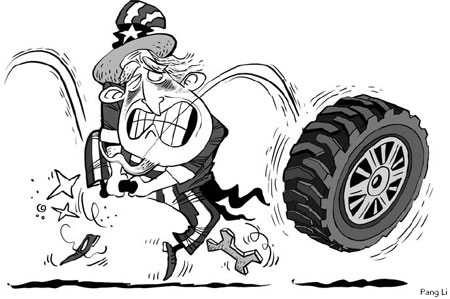A rubbery issue waiting for palatable resolution

US President Barack Obama has less than a month to decide whether to restrict the import of tires from China. The decision couldn't have come at a worse time, for the US administration has begun losing its popularity. Obama risks alienating a key ally at a crucial time no matter which side he supports: the unions or China.
The facts of the case are fairly straightforward and well known. The United Steel Workers union (USW) petitioned the US International Trade Commission (ITC), alleging that a spurt in tire imports from China had disrupted or threatened the US market. The USW alleges that the surge had already displaced 5,100 of its members. Interestingly, the petition was filed under a section of the US Trade Act - 421 to be precise - which was a negotiated quid for the quo of China's accession to the WTO in 2001. It is worth noting that the rubber industry has not been a party to the proceedings, and tire wholesalers and retailers have opposed the USW petition.
In June, the ITC sided with the USW with a 4:2 vote and recommended a regimen of tariffs over the next three years- of 55 percent, 45 percent and 35 percent. Under the rules, its recommendation was sent to the US president, who has until Sept 17 - one week before the G20 economic summit in Pittsburgh - to take a decision. It was at the last G20 summit in April that world leaders agreed to not raise any new trade barriers through 2010. So between now and Sept 17, Obama has three key political considerations to weigh: The politics of trade, domestic US politics and global politics.
The politics of trade: Four "421" cases reached George W. Bush's desk during his 8-year presidency. As a believer in free trade, he refused to act on any of them - a fact not lost on Obama as a presidential candidate. Obama promised more vigilance and campaigned mightily against Hillary Clinton in the manufacturing battleground states on a platform of a harder line on trade with China and the rest of the world.
While he lost Ohio and Pennsylvania to Clinton, he sharpened his message and attack on these issues in the general election and won both states over Republican John McCain. This was due in no small measure to the mass mobilization of the USW and their brethren. For their part, the unions were happy to at last have an ally in the White House.
Obama's campaign tapped into what has been a steadily rising tide of protectionism in the US over the past decade. These protectionist sentiments among the public, and the Democrats and Republicans have grown in the existing economic climate of greater job losses in the manufacturing sector.
On matters of trade, as with so many other issues, Obama is discovering that governing is more daunting and complex than campaigning. But with congressional elections next year, he cannot drift too far from his party's base.
US domestic politics: Obama is seeing his administration's popularity ratings drop as the chances of his comprehensive healthcare reform fade. Because of the rancorous debate on healthcare, climate change has been placed on the back burner. The healthcare fight is an intra-Democratic Party squabble, and Obama desperately needs to hold his party together.
Organized labor is the political linchpin of his party. But its top legislative priority - a bill to make it easier for workers to unionize - has been stalled and has received little push from the White House, much to the chagrin of the unions. One of the options being discussed in the healthcare debate is the taxation of healthcare benefits, a notion the unions vehemently oppose.
On climate change, manufacturing-state Senators (and unions) are getting more worried over the effect the legislation may have on jobs. Some liberal Democrats are threatening primary challenges for moderates in next year's congressional elections. And hence, Obama needs to keep the Democrats unified and organized labor happy, or risk the failure of his legislative program and harm the electoral prospects for his party in 2010.
Global politics: It is true that China is the US' biggest competitor. But it's also true that it is potentially its biggest partner and market. More importantly, China is the US' largest creditor, holding an estimated $1.6 trillion of US securities. Plus, China is central to any solution to climate change.
But all that pales in comparison with matters of national and global security. The Korean Peninsula nuclear issue looms large over the Obama administration, and China is the key in continuing to press the Democratic People's Republic of Korea to rejoin the Six-Party Talks. Against this backdrop, Obama must make the first major trade decision of his nascent presidency. Doug Palmer, of Reuters, lays out Obama's options well in his Aug 11 analysis. He says Obama could:
Follow the ITC's recommendations. This obviously would please his allies in organized labor, their members in the manufacturing states and the more protectionist-leaning, anti-trade Democrats in Congress. But it runs the risk of diminishing him on the world stage and angering China at a critical geopolitical time. Moreover, China may be able to contest this option before the WTO. Besides, by pursuing this course Obama could embolden other industries to file similar 421 cases, an unhappy prospect for him.
Follow in Bush's footsteps and reject the petition. This may please China but would infuriate organized labor. While it is not realistic to think organized labor would turn and support the Republicans, it could refuse to work on behalf of Obama's legislative and political agenda, thus virtually guaranteeing its demise.
Negotiate a deal with China. It is possible that the specter of tariffs may force the parties to negotiate as they have in the past to avert similar situations.
Palmer suggests the possibility that the parties cap imports at the current level. But it is doubtful whether that would be enough to assuage the USW.
There have been suggestions of a tariff "sweet spot", too - at a dramatically lower level - which would pare imports without driving up domestic prices of tires.
In his short political career, Obama has shown an ability to steer clear of divisive battles. He campaigned on a promise to bring a new era of cooperation to Washington. Weighing all these considerations, it is hard to believe he will make a decision that will alienate either a strong domestic or a global ally. At the end of the day, we can hope that back-channel diplomacy will prevail and a solution palatable to all sides can be found.
The author is Senior Vice-President of Public Affairs, Fleishman-Hillard's Washington DC office. He served in senior government roles in the Ronald Reagan and George H. Bush administrations.

(China Daily 08/25/2009 page9)








